1st of three parts
DAVAO CITY (MindaNews / 07 August) — “Where is the promise to the non-Moro Indigenous Peoples (IP)? Where is the promise that the Bangsamoro Organic Law will be more than the Indigenous People’s Rights Act (IPRA) +++? Where is the promise that the Bangsamoro Autonomous Region in Muslim Mindanao will be better than the Autonomous Region in Muslim Mindanao?”
Froilyn Mendoza, Executive Director of the Teduray Lambangian Women’s Organization Inc. asked these questions via social media on June 22, in a desperate call for help.
Nearly a thousand families from several villages in South Upi had fled their villages again since late May to avoid getting caught in a crossfire between government forces and non-state actors.
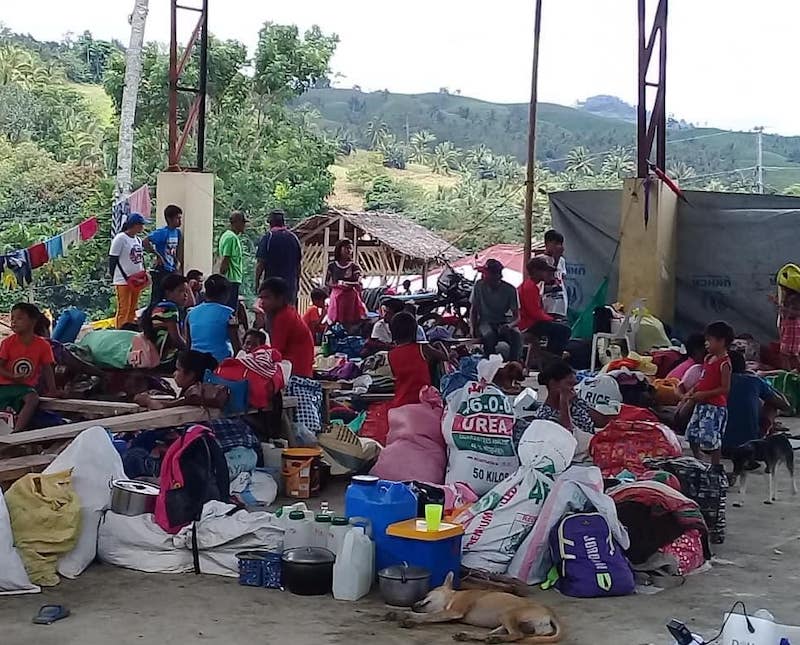
Residents of 13 sitios in Barangay Kuya, South Upi, Maguindanao, seek shelter in a covered court to avoid getting caught in a crossfire between warring forces. Photo courtesy of FROILYN MENDOZA
“There is so much violence in the IP lands and everybody is deaf. Nakakabinging katahimikan” (deafening silence), she said as she asked the national government: “where are the peace mechanisms?”
“Impunity is incredible: violent action by armed non-state actors who are free to sow terror and violent action by the rule of the jungle is the law,” she wrote.
She told MindaNews that two days earlier, at around 10 p.m., Sitio Bahar in Barangay Pandan, South Upi, was attacked by armed men, the bullets grazing parts of around 10 houses, a Catholic chapel, carabaos and pigs.
It was not the first time residents fled their villages because of conflict over land. In the past two years, residents have repeatedly evacuated, she said, citing “landgrabbing, harassment of IP farmers” such as being fired at or pointed a gun to.
“The big one was on May 29 at around 8 a.m. when the AFP (Armed Forces of the Philippines) and MILF (Moro Islamic Liberation Front) clashed and at around 1 p.m. the gunfire was so intense residents in the 13 sitios fled to the covered court in Barangay Kuya,” she said in Filipino.
Lt. Col. Edgardo Vilchez, commander of the Joint Task Force Central and spokesperson of the Army’s 6th Infantry Division told MindaNews on June 2 that the clash was “between feuding families – MILF-affiliated groups and Betita Clan.”
Mendoza said armed men affiliated with the MILF claimed the area as theirs
“but this is a traditional area of the IP and is part of our ancestral domain claim.”
The MILF is a non-state actor, the largest Moro revolutionary group that forged a peace agreement with the government in March 2014 and is currently in the process of demobilizing the combatants and weapons of its armed wing, the Bangsamoro Islamic Armed Forces.
Since last year, however, the MILF leadership has become a state actor, having been appointed to lead the 80-member Bangsamoro Transition Authority (BTA), the body mandated to govern the BARMM during the three-year transition period until June 30, 2022.
The BTA is composed of 41 members nominated by the MILF and 39 by government. Its Chief Minister is Ahod Balawag Ebrahim, more popularly known by his nom de guerre, Al Haj Murad Ebrahim, chair of the MILF since July 2003.
“New dawn for the Moro”
The ratification of Republic Act 11054 or the Organic Law for the BARMM in January last year paved the way for the MILF to take political power over the Moro-dominated region five years after it signed the Comprehensive Agreement on the Bangsamoro on March 27, 2014.
On February 22, 2019, President Rodrigo Duterte administered the oath for at least 70 members of the BTA in Malacanang.
On February 26, ARMM Governor Mujiv Hataman, whose three-year term was cut short by four months as the new law abolished the ARMM upon its ratification, handed over governance to the BARMM, now an expanded autonomous region comprising the ARMM’s core territory of Lanao del Sur, Maguindanao, Basilan, Sulu, Tawi-tawi and the cities of Marawi and Lamitan — plus the city of Cotabato and 63 villages in North Cotabato.
“There is so much violence in the IP lands and everybody is deaf. Nakakabinging katahimikan” (deafening silence), she said as she asked the national government: “where are the peace mechanisms?”
“Impunity is incredible: violent action by armed non-state actors who are free to sow terror and violent action by the rule of the jungle is the law,” she wrote.
She told MindaNews that two days earlier, at around 10 p.m., Sitio Bahar in Barangay Pandan, South Upi, was attacked by armed men, the bullets grazing parts of around 10 houses, a Catholic chapel, carabaos and pigs.
It was not the first time residents fled their villages because of conflict over land. In the past two years, residents have repeatedly evacuated, she said, citing “landgrabbing, harassment of IP farmers” such as being fired at or pointed a gun to.
“The big one was on May 29 at around 8 a.m. when the AFP (Armed Forces of the Philippines) and MILF (Moro Islamic Liberation Front) clashed and at around 1 p.m. the gunfire was so intense residents in the 13 sitios fled to the covered court in Barangay Kuya,” she said in Filipino.
Lt. Col. Edgardo Vilchez, commander of the Joint Task Force Central and spokesperson of the Army’s 6th Infantry Division told MindaNews on June 2 that the clash was “between feuding families – MILF-affiliated groups and Betita Clan.”
Mendoza said armed men affiliated with the MILF claimed the area as theirs
“but this is a traditional area of the IP and is part of our ancestral domain claim.”
The MILF is a non-state actor, the largest Moro revolutionary group that forged a peace agreement with the government in March 2014 and is currently in the process of demobilizing the combatants and weapons of its armed wing, the Bangsamoro Islamic Armed Forces.
Since last year, however, the MILF leadership has become a state actor, having been appointed to lead the 80-member Bangsamoro Transition Authority (BTA), the body mandated to govern the BARMM during the three-year transition period until June 30, 2022.
The BTA is composed of 41 members nominated by the MILF and 39 by government. Its Chief Minister is Ahod Balawag Ebrahim, more popularly known by his nom de guerre, Al Haj Murad Ebrahim, chair of the MILF since July 2003.
“New dawn for the Moro”
The ratification of Republic Act 11054 or the Organic Law for the BARMM in January last year paved the way for the MILF to take political power over the Moro-dominated region five years after it signed the Comprehensive Agreement on the Bangsamoro on March 27, 2014.
On February 22, 2019, President Rodrigo Duterte administered the oath for at least 70 members of the BTA in Malacanang.
On February 26, ARMM Governor Mujiv Hataman, whose three-year term was cut short by four months as the new law abolished the ARMM upon its ratification, handed over governance to the BARMM, now an expanded autonomous region comprising the ARMM’s core territory of Lanao del Sur, Maguindanao, Basilan, Sulu, Tawi-tawi and the cities of Marawi and Lamitan — plus the city of Cotabato and 63 villages in North Cotabato.
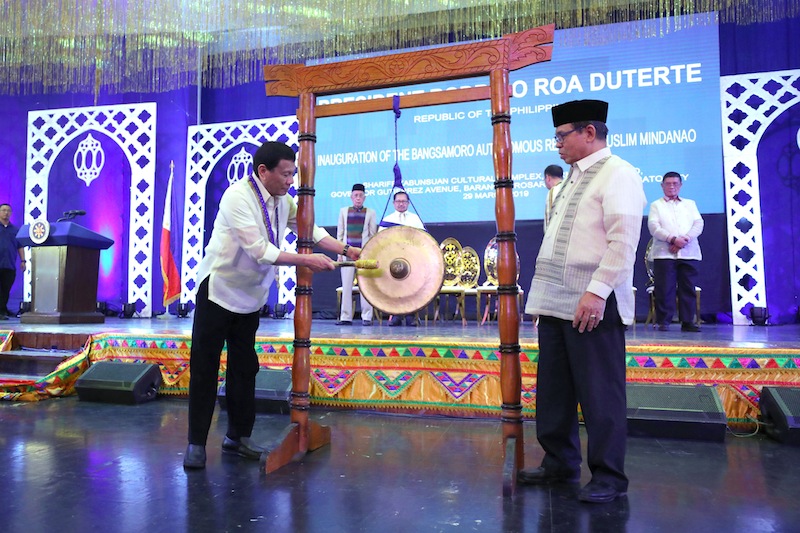
President Rodrigo Roa Duterte sounds the agong to signal the inauguration of the Bangsamoro Autonomous Region in Muslim Mindanao (BARMM) at the Shariff Kabunsuan Cultural Complex in Cotabato City on March 29, 2019. Joining the President is BARMM Interim Chief Minister Al Haj Murad Ebrahim. ROBINSON NIÑAL JR./PRESIDENTIAL PHOTO
In the BARMM’s inaugural on March 29, 2019, President Duterte told the BTA: “The power to chart the course of your region’s future is now in your hands. I trust that you will wield this power with utmost care, the future of succeeding generations of the Filipinos, especially the Moro of Mindanao, depends on it.”
He described the BARMM as the new autonomous entity “that we had envisioned to address the injustices of the past and plot the new course towards a more promising future for Mindanao and the rest of the country … a new dawn for the Moro.”
“For the next three years, we will all work and truly work for the benefit of the Bangsamoro people,” the country’s first Mindanawon President who claims to have Moro roots, said.
Duterte’s six-year term ends at noon on June 30, 2022, the same day the BTA steps down to give way to the first set of elected officials of the BARMM.
Ministry of Indigenous People’s Affairs
While the Bangsamoro law was being drafted, the Office of the Presidential Adviser on the Peace Process, then headed by Jesus Dureza, created in April 2017 an Indigenous People’s Peace Panel to provide a venue for IPs to discuss and propose policy recommendations during the peace processes with the MILF and National Democratic Front.
In the BARMM’s inaugural on March 29, 2019, President Duterte told the BTA: “The power to chart the course of your region’s future is now in your hands. I trust that you will wield this power with utmost care, the future of succeeding generations of the Filipinos, especially the Moro of Mindanao, depends on it.”
He described the BARMM as the new autonomous entity “that we had envisioned to address the injustices of the past and plot the new course towards a more promising future for Mindanao and the rest of the country … a new dawn for the Moro.”
“For the next three years, we will all work and truly work for the benefit of the Bangsamoro people,” the country’s first Mindanawon President who claims to have Moro roots, said.
Duterte’s six-year term ends at noon on June 30, 2022, the same day the BTA steps down to give way to the first set of elected officials of the BARMM.
Ministry of Indigenous People’s Affairs
While the Bangsamoro law was being drafted, the Office of the Presidential Adviser on the Peace Process, then headed by Jesus Dureza, created in April 2017 an Indigenous People’s Peace Panel to provide a venue for IPs to discuss and propose policy recommendations during the peace processes with the MILF and National Democratic Front.
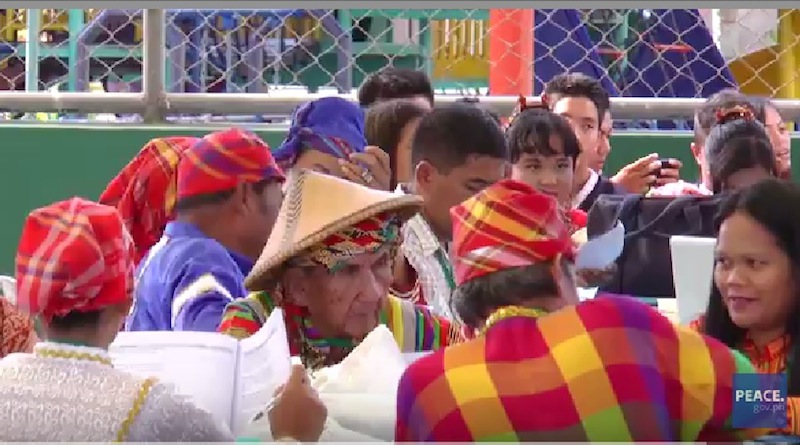
Leaders of Indigenous Peoples in the Bangsamoro core territory air their concerns at the Mindanao Indigenous Peoples’ Legislative Assembly (MIPLA) on August 29, 2017 in Davao City. Screen grabbed from OPAPP video
The panel organized the Mindanao Indigenous People’s Legislative Assembly (MIPLA) from August 30 to September 1, 2017, to push for the rights of IPs in the Bangsamoro region, including the rights already provided for under the Indigenous Peoples Rights Act (IPRA) of 1997.
The panel organized the Mindanao Indigenous People’s Legislative Assembly (MIPLA) from August 30 to September 1, 2017, to push for the rights of IPs in the Bangsamoro region, including the rights already provided for under the Indigenous Peoples Rights Act (IPRA) of 1997.
Dureza said the purpose of MIPLA was “not to inspire and even provoke IPs to do something that will probably be blocking the Bangsamoro Basic Law (BBL) but to be heard by the Bangsamoro Transition Commission (BTC),” the body tasked to draft the law.
The draft Bangsamoro law submitted by the BTC in 2017, made no mention of IPRA, as the BTC draft did not in 2014 but IPRA was in the Bangsamoro law when it was passed in July 2018.
In the run-up to the January 2019 ratification, a number of IPs expressed fears of land dispossession as word spread in their communities that armed men claiming to be MILF spoke of taking over their lands once the law is ratified. The MILF denied the allegations and pointed to provisions of the law to assure the IPs their rights would be protected.
RA 11054 provides that the Bangsamoro Government “shall recognize and promote the rights of non-Moro indigenous peoples within the framework of the Constitution and national laws,” that freedom of choice shall be respected, that IPs shall have the freedom to “retain their distinct indigenous and ethnic identity in addition to their Bangsamoro political identity” and that there shall be “no discrimination on the basis of identity, religion, and ethnicity.”
The Bangsamoro Government, it adds, recognizes the rights of the IPs and shall adopt measures for the promotion and protection of their “native titles or fusaka inged; indigenous customs and traditions, justice systems and indigenous political structures, equitable share in revenues from the utilization of resources in their ancestral lands; free, prior and informed consent; political participation in the Bangsamoro Government including two reserved seats in the Parliament; basic services; and freedom of choice as to their identity.”
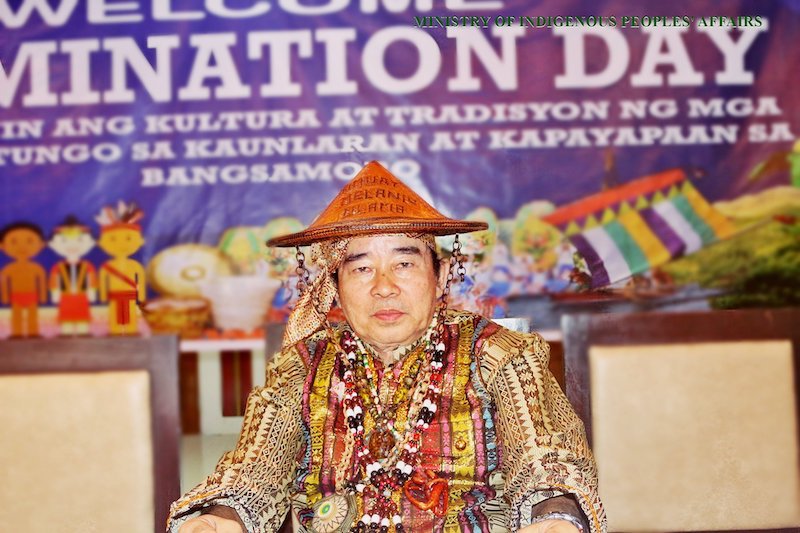
Timuay Melanio Ulama, Bangsamoro Member of Parliament, heads the Ministry of Indigenous Peoples’ Affairs. Photo courtesy of MIPA FB page
On top of these, it provides for a Ministry of Indigenous People’s Affairs (MIPA) to be part of the Cabinet. Headed by Timuay Melanio Ulama, the MIPA has the “primary responsibility to formulate and implement policies, plans, and programs to promote the well-being of all” IPs in the BARMM “in recognition of their ancestral domain as well as their rights.”
Under the law, the BARMM has exclusive rights over “ancestral domain and natural resources.”
Ancestral domain / domains
Ulama, a Teduray, was a member of the technical committee of the MILF peace panel, and a member of the first and second BTC that drafted the Bangsamoro law.
The first BTC was from 2013 to 2014, during the administration of President Benigno Simeon Aquino III. Under his leadership, the breakthrough Framework Agreement on the Bangsamoro in October 2012 and the Comprehensive Agreement on the Bangsamoro in March 2014 were signed, ending 17 years of peace negotiations.
On top of these, it provides for a Ministry of Indigenous People’s Affairs (MIPA) to be part of the Cabinet. Headed by Timuay Melanio Ulama, the MIPA has the “primary responsibility to formulate and implement policies, plans, and programs to promote the well-being of all” IPs in the BARMM “in recognition of their ancestral domain as well as their rights.”
Under the law, the BARMM has exclusive rights over “ancestral domain and natural resources.”
Ancestral domain / domains
Ulama, a Teduray, was a member of the technical committee of the MILF peace panel, and a member of the first and second BTC that drafted the Bangsamoro law.
The first BTC was from 2013 to 2014, during the administration of President Benigno Simeon Aquino III. Under his leadership, the breakthrough Framework Agreement on the Bangsamoro in October 2012 and the Comprehensive Agreement on the Bangsamoro in March 2014 were signed, ending 17 years of peace negotiations.
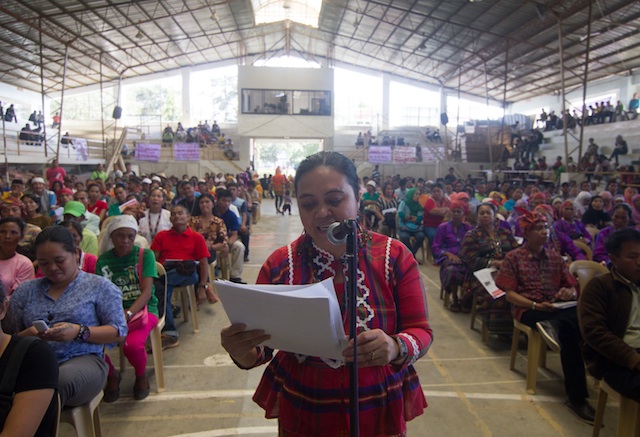
2014 photo of then Commissioner Froilyn Mendoza, one of two IP representatives in the 15-member Bangsamoro Transition Commission. at the public hearing of the Ad Hoc Committee on the Bangsamoro Basic Law on October 22, 2014 at the Upi School Gym in Upi, Maguindanao. MindaNews file photo by TOTO LOZANO
The first BTC was composed of 15 members, two of them representing non-Moro IPs: Ulama who was nominated by the MILF and Mendoza who was nominated by government.
On April 20, 2014, the BTC completed its draft law for submission to Malacanang, with 13 commissioners signing, although two with reservations, and two commissioners absent.
Mendoza was one of the two who signed with reservations as some of the issues she fought for, among them the recognition of IPRA within the BBL and “ancestral domains” instead of just ancestral domain, were not approved.
Mendoza argued that instead of “ancestral domain,” it should be “ancestral domains” to “recognize that there are ancestral domains in the Bangsamoro belonging to the Indigenous Peoples consistent with the context of ancestral domain in the Indigenous Peoples Rights Act.”
Mohagher Iqbal, then chair of the MILF peace panel and the BTC, told a forum on May 23, 2014 that for those who believe that the IPRA answers the long struggle of the IPs to protect their ancestral domain claim, “rest assured that we respect that stand. There is no rancor in our heart. It is part of their right to self-determination.”
The first BTC was composed of 15 members, two of them representing non-Moro IPs: Ulama who was nominated by the MILF and Mendoza who was nominated by government.
On April 20, 2014, the BTC completed its draft law for submission to Malacanang, with 13 commissioners signing, although two with reservations, and two commissioners absent.
Mendoza was one of the two who signed with reservations as some of the issues she fought for, among them the recognition of IPRA within the BBL and “ancestral domains” instead of just ancestral domain, were not approved.
Mendoza argued that instead of “ancestral domain,” it should be “ancestral domains” to “recognize that there are ancestral domains in the Bangsamoro belonging to the Indigenous Peoples consistent with the context of ancestral domain in the Indigenous Peoples Rights Act.”
Mohagher Iqbal, then chair of the MILF peace panel and the BTC, told a forum on May 23, 2014 that for those who believe that the IPRA answers the long struggle of the IPs to protect their ancestral domain claim, “rest assured that we respect that stand. There is no rancor in our heart. It is part of their right to self-determination.”
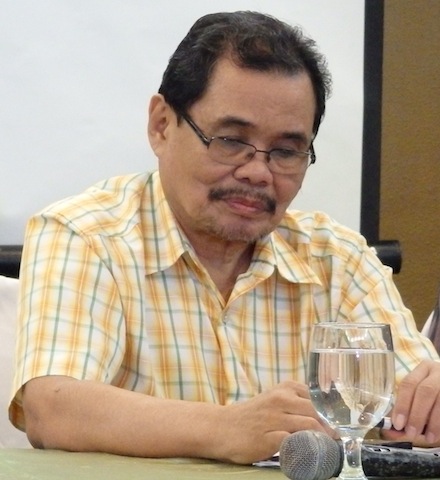
Mohagher Iqbal, chair of the MILF peace panel and the Bangsamoro Transition Commission, August 2014. File photo by Carolyn O. Arguilas
But Iqbal appealed to the IPs to “also respect the view and stand of the MILF, clearly contained in all signed documents and in the proposed BBL, that there is only one ancestral domain in the Bangsamoro, which is owned by Moros and IPs. Give us the chance to prove that in the Bangsamoro, the IPs have a bright future. This we will prove once the Bangsamoro is in place.”
Congress failed to pass the law under the Aquino administration which bowed out of office on June 30, 2016.
Another BTC was set up under President Duterte, Aquino’s successor. The drafting body was expanded to 21 with two IP representatives – Ulama, again nominated by the MILF and Romeo Saliga, nominated by the government.
Saliga, a Teduray from Maguindanao, was Mendoza’s executive assistant when she was BTC Commissioner. Saliga was Executive Director of the defunct Lumad Development Center.
Ulama and Saliga were appointed to the BTA and are now Members of Parliament.(Carolyn O. Arguillas / MindaNews)

No comments:
Post a Comment
Note: Only a member of this blog may post a comment.